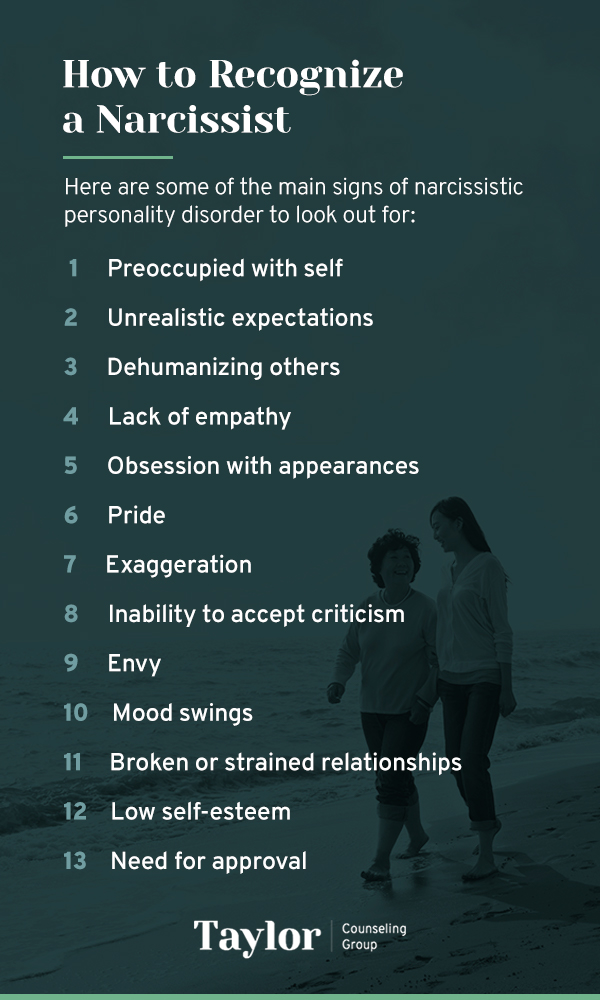An estimated 5% of the U.S population may have narcissistic personality disorder (NPD), which means over 16 million people might experience the condition. With so many people exhibiting narcissistic behavior, there’s a high chance you know someone who is severely self-absorbed. When confronted with toxic narcissism, removing yourself from the relationship is often the best course of action.
But what can you do when that narcissistic person is a family member? In this guide, we’ll help you recognize the traits of a narcissist and outline the steps to take to protect your own mental health.
How to Recognize a Narcissist
Narcissism is far more complex than mere vanity or selfish tendencies. True narcissism is a clinically recognized personality disorder known as Narcissistic Personality Disorder (NPD). NPD is described by the Diagnostic and Statistical Manual of Mental Disorders (DSM) as a pattern of grandiosity, the need for admiration and a lack of empathy. A narcissistic person is fixated on their own uniqueness, self-importance and sense of entitlement.
Essentially, narcissism is characterized by an inability to genuinely understand others’ needs. Someone with NPD is often solely concerned with themselves and their needs, unable to properly process or engage with the world around them.
This can make them emotionally exhausting to be around, particularly in toxic family dynamics.
The sense of entitlement a person with NPD has can be so extreme, that they expect unreasonable special treatment and will do whatever it takes to be the center of everyone’s universe — for better or for worse. This need to be the center of attention and their inability to respect emotional boundaries often leads to toxic behavior.
Here are some signs of narcissistic behavior to look out for:
- Preoccupied with self: A narcissist man or narcissist woman can be consumed with disproportionate senses of self-concern, self-centeredness and self-consciousness. Their strong feelings of entitlement may lead them to expect constant attention and admiration from others.

- Unrealistic expectations: The expectations of constant attention and admiration are paired with more unrealistic expectations that others will instantly comply with all their wishes without question.
- Dehumanizing others: Those with NPD might interact with people based on whether they believe that person can offer something beneficial to them, such as social status, a job or emotional fulfillment.
- Lack of empathy: Narcissists often lack empathy as a result of dehumanizing others. Someone with NPD might not attempt to understand the perspective or feelings of anyone besides themselves, resulting in a lack of compassion and remorse for any wrongdoings.
- Obsession with appearances: Narcissists can be fixated on beauty and other aspects of their appearance to others, such as wealth, fame, success and reputation. A narcissist commonly fantasizes about great success, power and beauty.
- Pride: Being obsessed with appearances can cultivate a prideful personality. A narcissist might come off as vain or immodest as a result of their pride.
- Dishonesty: To boost their appearance and importance, an individual with NPD might lie about or exaggerate their skills and accomplishments.
- Envy: A person with NPD needs to constantly feel like the most successful and powerful person in the room. If they feel as though someone else is outshining them, they can quickly become jealous and may try to knock the other person down. How narcissists treat their siblings is a a contentious issue. Rivalries can turn toxic.
- Mood swings: Someone with NPD is often psychologically fragile and might struggle to regulate their emotions. This inability to properly balance their feelings can result in sudden and severe emotional outbursts.
- Broken or strained relationships: Narcissists tend to have difficulties within their relationships because loved ones may not tolerate put-downs, contempt and carelessness. Their inability to respect emotional boundaries leads to frequent conflicts. Often, people reach a breaking point and have to cut ties with a narcissist.
- Low self-esteem: Despite the outward appearance, those with NPD may not love themselves as they want others to believe they do. Feelings of superiority are usually rooted in a deep sense of insecurity. They typically express poor self-esteem via self-deprecation or arrogance, working hard to overcompensate for their lack of confidence.
- Need for approval: A narcissist’s lack of self-esteem drives them to actively seek validation from others. Whether the narcissist’s inadequacies are real or imagined, they experience a significant need for approval from other people.
- Inability to accept criticism: If you wonder how to confront a narcissist, know that they react poorly to feedback, even when it’s constructive.
It is important to remember that Narcissistic traits exist on a spectrum. While we all can go through bouts of selfishness or self-consciousness, there is a difference between having a few narcissistic characteristics and having narcissistic personality disorder (NPD). Those who feel they may be a narcissist most likely are not one because true narcissists lack the empathetic sort of self-reflection required to wonder whether they have a personality disorder.
In the same way we should avoid self-diagnosing NPD, we should resist deeming others to be narcissists. Only a psychiatrist or qualified therapist should examine and diagnose anyone’s mental health and possible personality disorders. Our award-winning counseling services help patients identify and address narcissistic traits, as well as help patients handle narcissistic family members.
Schedule An Appointment Online Today
How to Deal With a Narcissistic Family Member
Many times, cutting ties with a narcissistic person is the most viable and effective way to prevent further emotional trauma or abuse. This decision may not be an option if you are related to or living with someone who has NPD. When leaving is not an option, you need a new set of strategies for dealing with a narcissistic family member.
Whether you’re dealing with a narcissistic sibling, a narcissistic husband, or a parent, you need strategies to manage the situation. Discover how to deal with a narcissist you can’t avoid with these tips:
1. Avoid Direct Confrontation
Because those with NPD are extremely sensitive to criticism, calling a true narcissist a narcissist typically backfires and worsens the situation. Regardless of any good intent behind the criticism or how constructive it is, those with NPD cannot reflect on their own behavior enough to see any truth behind the accusation. Instead, they typically become obsessed with proving you’re the one with a problem and demanding an apology.
If you feel you have to address the issue, try to be smart about how you approach the conversation. Someone with NPD will only be receptive to negative feedback delivered in small doses and laden with flattery. Instead of launching right into the discussion with your grievances against them, offer compliments first.
Specifically, try using the compliment sandwich approach, which involves both opening and closing the conversation with positive remarks about the person you’re talking with. For instance, begin by sharing what you love about them, then mention how they could change their behavior to improve your relationship. End with how confident you are they will be successful in making these changes.This prevents the narcissistic person from feeling attacked.
2. Don’t Accept Harmful Behaviors

For the same reason, it is typically futile to confront a narcissist; it’s unwise to argue with one. An argument with a narcissistic husband or narcissistic sibling can also quickly turn to verbal abuse due to their lack of empathy and interpersonal skills. Dealing with manipulation from a narcissist can be exhausting, as they often shift blame, deny wrongdoing, or use gaslighting in relationships — a specific type of manipulation that involves getting someone to question their own reality.
Because those with NPD are concerned with themselves and tend to see themselves as the hero, they may attempt to blame you for their behaviors. They view themselves as victims because they refuse to recognize they may play a part in any problem. Continuing to argue with a narcissist will only reaffirm their preconception that you are the one attacking them. Instead, disengage from the conversation and do whatever you can to remove yourself from the situation.
If your toxic narcissistic family member becomes aggressive, abusive, or emotionally manipulative, you must make it clear you will not accept that kind of behavior. Do not hesitate to contact an expert and get them professional help if these behaviors worsen over time.
3. Focus on Choices
One key to dealing with a narcissist is focusing on choices, both yours and theirs. People with NPD often insist others treat them unfairly and don’t give them the respect they’re due. They fail to see how their own behaviors could impact the way others interact with them. When a narcissistic family member starts talking like this, simply remind them they have some choices in the situation. For example, remind them they can change how they act or who they choose to be around.
Keep in mind that you have choices, too. Even if you can’t completely eliminate contact with someone who has NPD, you can still take measures to protect yourself and make their behavior less harmful to you. You can choose to limit your time with them or make sure someone else is always around so you are never alone with them.
When restricting your contact with a narcissistic family member, clearly communicate your boundaries. Make sure they know you will break off contact if certain behaviors persist, and be specific about the circumstances and how you will respond. You can tell a narcissist you want to spend time with them, for instance, but if they make insulting comments about your career, you will have to leave the room. This technique puts the ball in their court by allowing them to choose whether or not to comply. Ultimately, you may choose to reach out to a professional and take a clinical approach to the toxic relationship.
4. Set Limits
Unfortunately, those with NPD struggle with setting healthy boundaries. They might resort to manipulating others to meet their needs. Although you cannot control the behaviors of a narcissist, you can control your own. Family members of a narcissist often become accustomed to enabling narcissists to avoid a fight. But you can refuse to participate in this cycle any longer by setting limits on what you will do.
You may stop allowing your narcissistic family member to speak to you disrespectfully anymore or quit agreeing with any disparaging words they share about others. You may also stop replying to texts so frequently or set a time limit on your phone conversations to avoid listening to rants.
Be prepared for the possibility that your narcissistic family member does not respect your emotional boundaries. Those with NPD tend to view themselves as the most important person in the world. Despite your best efforts to reach a compromise, the only effective solution may be to cut off contact completely. If this is the case, there is no shame in cutting ties for the sake of your own mental health.

5. Get Support and Professional Counseling
When dealing with emotional abuse from a narcissistic family member, it’s essential to have a strong support system and receive counseling from a mental health professional. Dealing with a narcissistic loved one can feel lonely and induce low self-esteem due to all the insults, public humiliation and other forms of abuse. Try to be gentle with yourself and protect yourself from being gaslit into believing you’re the one at fault.
With the support of friends and professional counselors, you can gain perspective and learn you don’t need to be ashamed or embarrassed about your situation. Discussing your situation and understanding manipulative behavior one-on-one with a counselor or even with other close relatives in a clinical setting can help boost your confidence and help you decide on the best approach to interacting with your narcissistic family member or coping with difficult relatives in general.
Heal From Narcissism With Taylor Counseling Group
Whether you decide to cut ties or get the distance you need in another way, counseling can offer the resources you need to stop enabling a narcissistic family member while remaining connected as a family. At Taylor Counseling Group, we offer therapy services to help clients understand manipulative behavior, establish emotional boundaries, and regain self-confidence.
We have offices in several key Texas areas, including the following:
If you’re feeling lost in toxic family dynamics, know that you don’t have to navigate it alone. Whether you’re coping with difficult relatives or figuring out how to help a narcissist, therapy can offer the tools you need to move forward with confidence.
Along with our therapy offices in Texas, we also offer tele-health counseling services for patients who can’t attend in-person appointments. You can easily book online with our convenient client portal. If you’d rather speak to a real person, we’re happy to answer any questions you may have!






